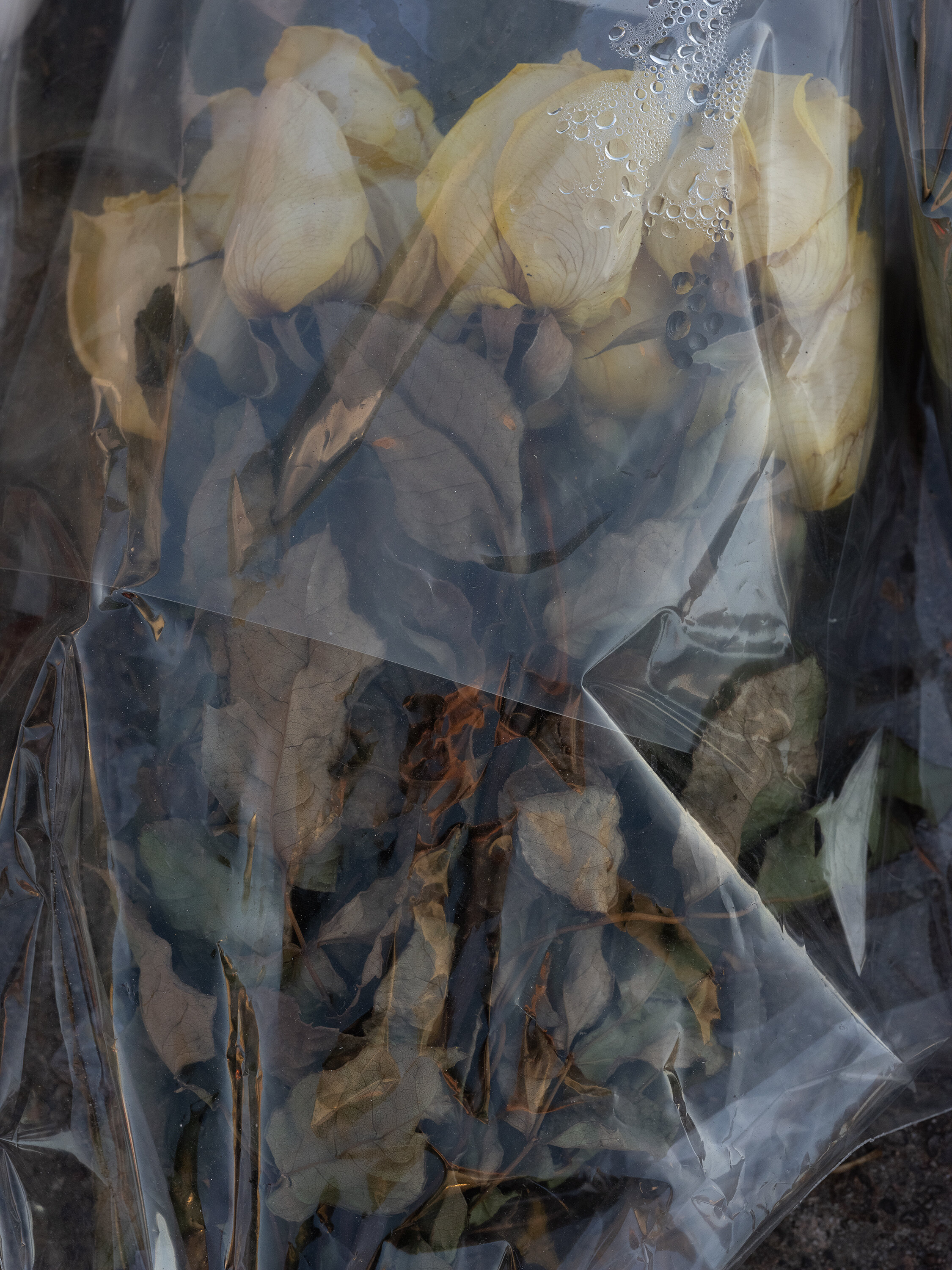
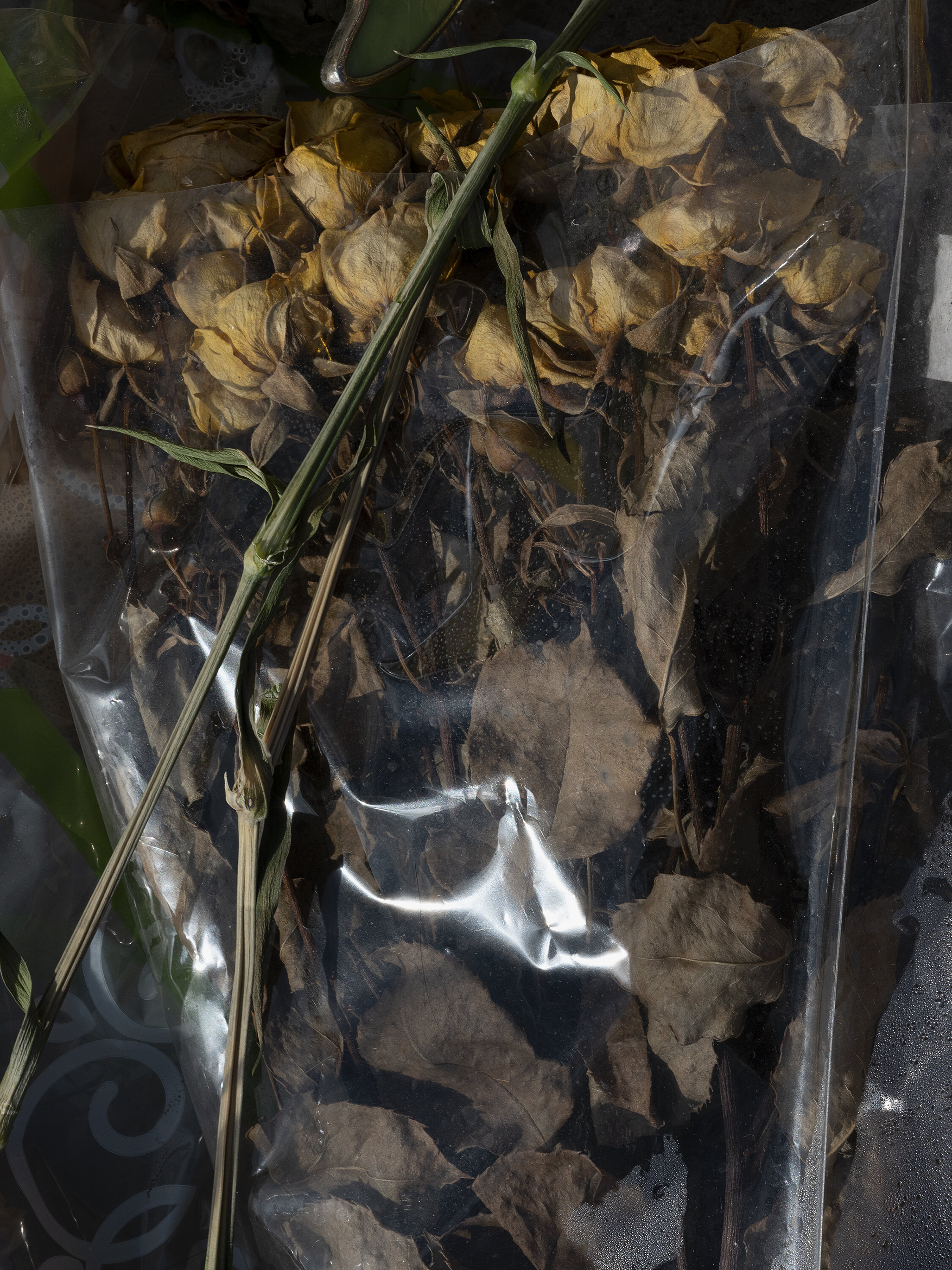
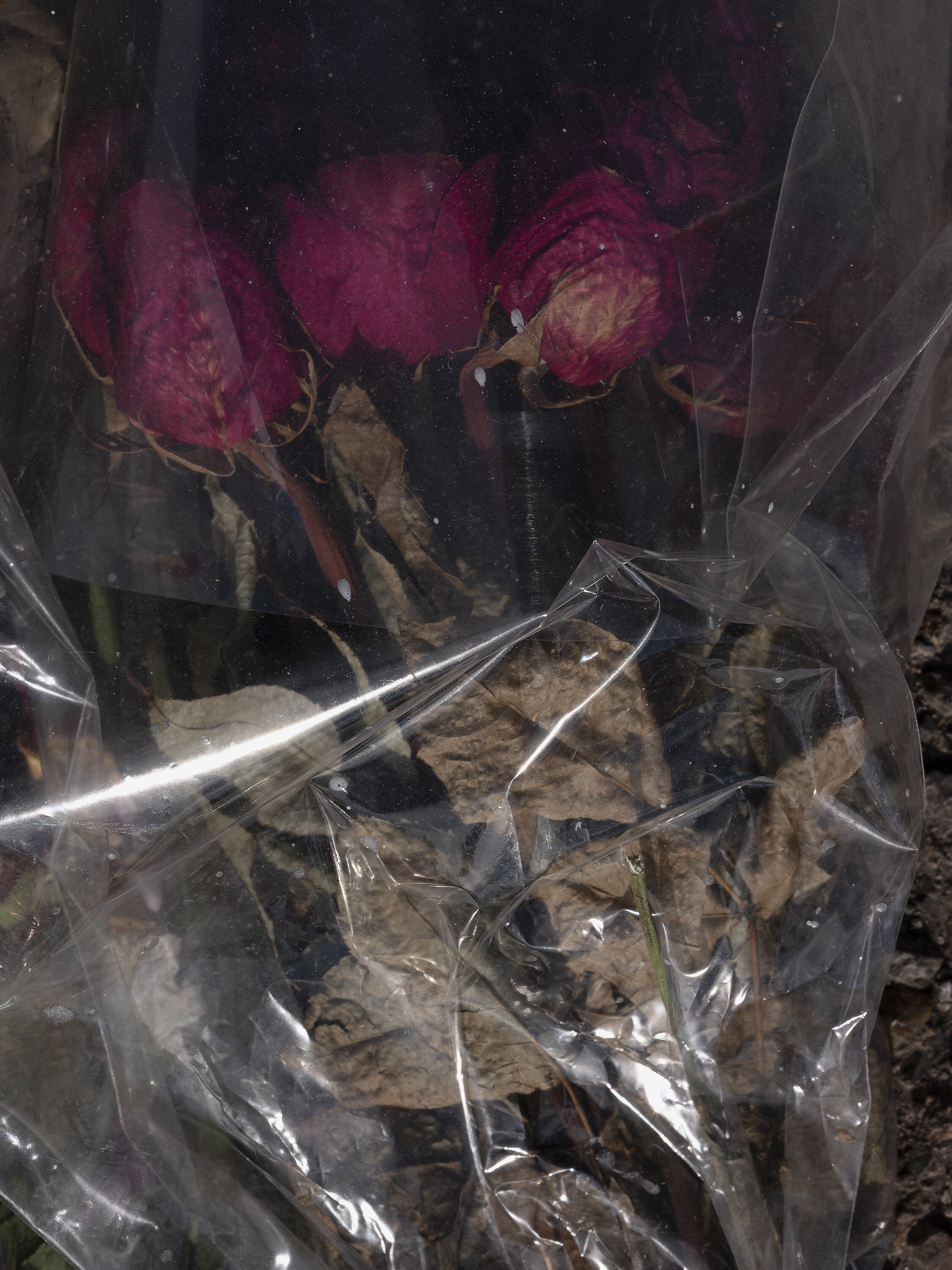
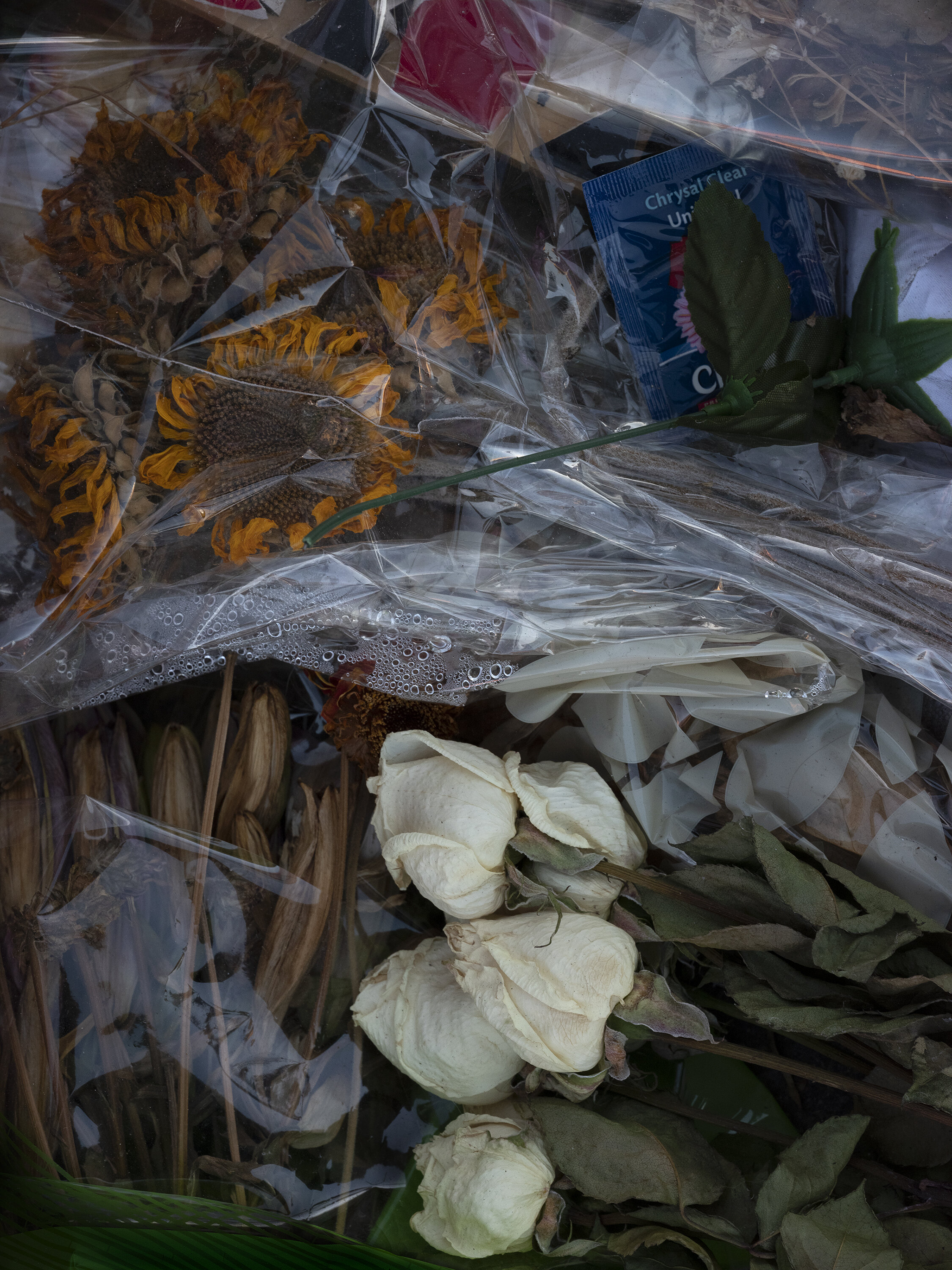
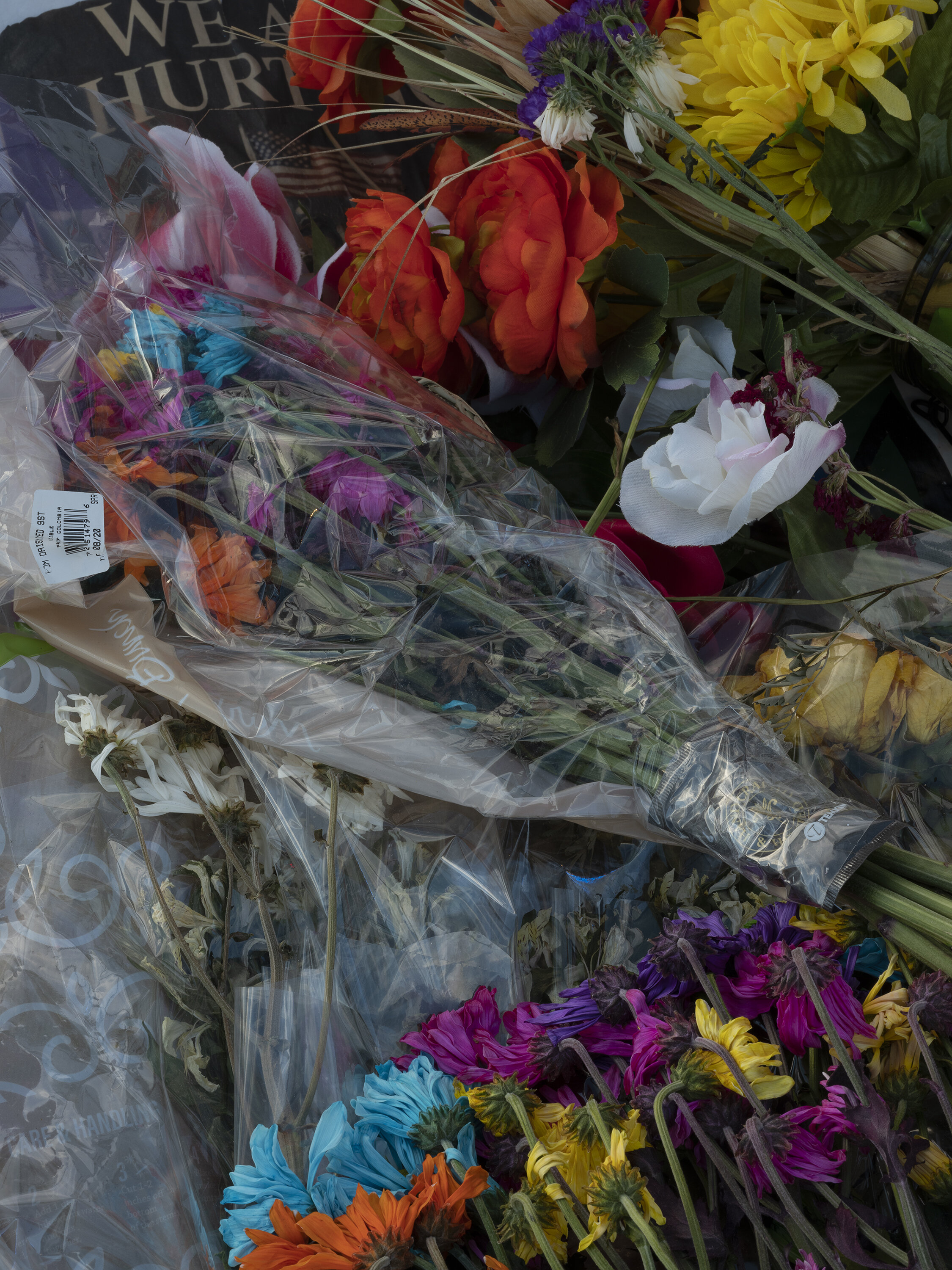
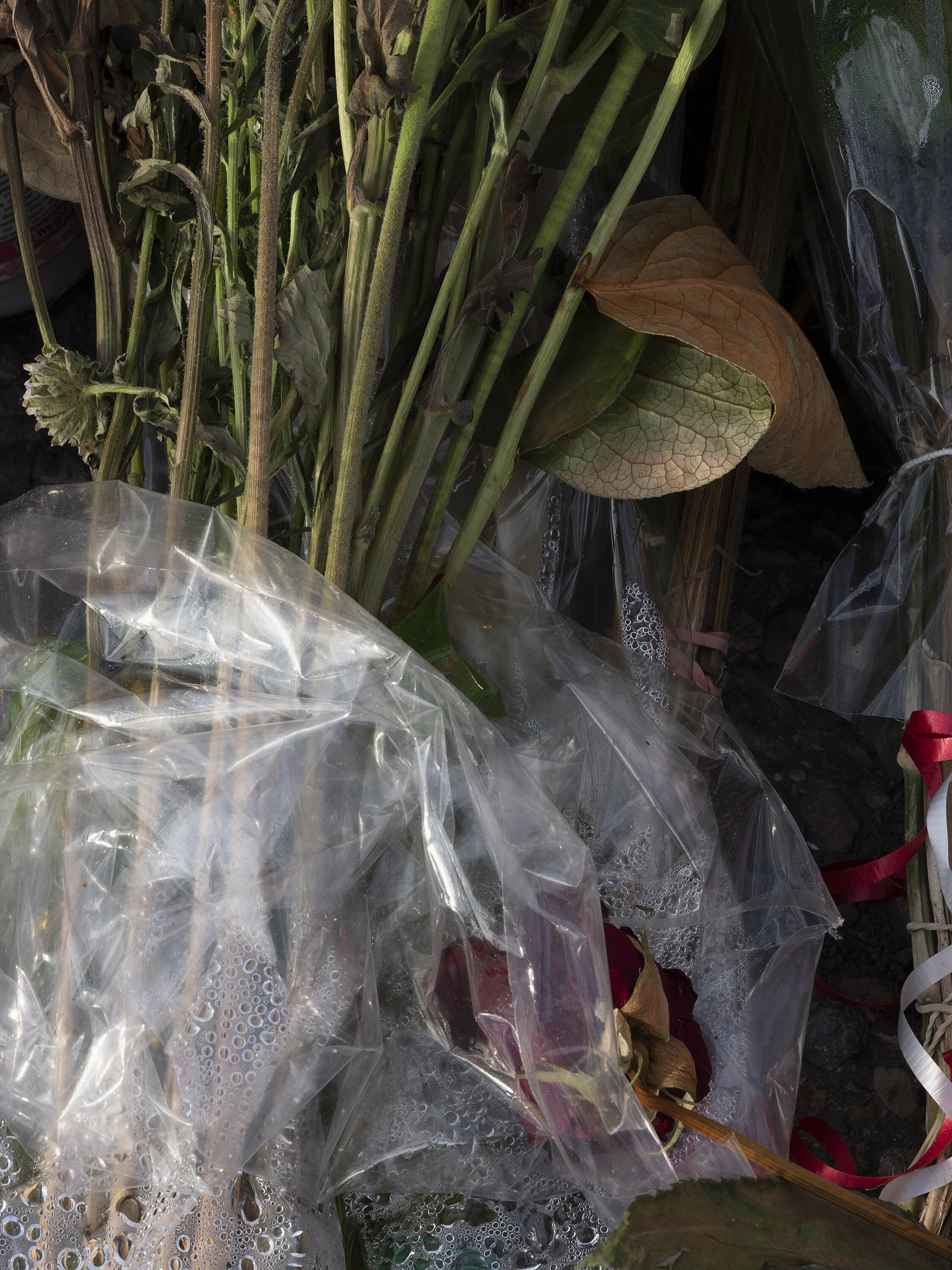
John Willis, Robin Behn, Matan Rubinstein
Requiem for the Innocent
Requiem for the Innocent is an artists’ collaboration of poetry and text by Robin Behn, music by Matan Rubinstein, and Willis’ photographs. A small speaker accompanies each image with music composed for each individual piece.
On Saturday morning, August 3, 2019, a twenty-one-year-old self-declared white supremacist from Allen, Texas, targeted “Mexicans” in a hate crime and shot and killed twenty-three people who were shopping at the Cido Vista Walmart (Supercenter #512) in El Paso.
John Willis and his wife, Pauline, were traveling and in El Paso a few days after the mass shooting. Willis was deeply moved by the memorials which had been created, one for each of the 23 people who were killed. He watched hundreds of people silently observing each memorial as the extent of the senseless act became more and more devastating. He began to photograph, not the observers, but the memorials to the loved ones lost.
There are 18 photographs in the exhibit of the memorial items at the site. He observed numerous bouquets of flowers – living and dying and, among the flowers, American flags. Flowers have always been a symbol of our sympathy, grief, love, and sentiments. The mood in the gallery is one of reverence. Please remember…
The book, Requiem for the Innocent: El Paso and Beyond is a creative collaboration between photographer John Willis, poet Robin Behn, and musician Matan Rubinstein and is meant to honor the memory of the innocent people who died and the others who were injured. All royalties earned from the sale of the book are being donated to the families of those who died and were injured on that fateful day in El Paso. The book and exhibition also honor and remind us of the countless others who have suffered – and continue to suffer from hate and violence in any form, including those murdered and affected by other mass shootings.
John Willis is a photographer who is currently living and teaching in Rhode Island. From 1990 until his retirement in 2020, he was a professor of art at Marlboro College. He has received a John Simon Guggenheim Memorial Foundation Fellowship in Photography and many other grants. His photographs are in more than sixty collections, among them the Amon Carter Museum, Center for Creative Photography, George Eastman Museum of Photography and Film, J. Paul Getty Museum, Heard Museum, High Museum of Art, Library of Congress, Museum of Fine Arts, Boston, Museum of Fine Arts, Houston, National Gallery of Art, San Francisco Museum of Modern Art, Tokyo Metropolitan Museum of Photography, and Whitney Museum of American Art. His books include Mni Wiconi / Water Is Life: Honoring the Water Protectors at Standing Rock and Everywhere in the Ongoing Struggle for Indigenous Sovereignty (George F. Thompson Publishing, 2019), Views from the Reservation: A New Edition (George F. Thompson Publishing, 2019; originally published in 2010 by the Center for American Places at Columbia College Chicago), and, with Tom Young, Recycled Realities (Center for American Places, 2006). His most recent collaborative book project Requiem for the Innocent, El Paso and Beyond has been printed and is available. The book is a collaboration with writer Robin Behn and composer Matan Rubinstein (George F. Thompson Publishing 2020).
Matan Rubinstein is a composer, pianist, electronic musician and sound designer, active in a variety of contexts and modalities: from concert works for orchestra and chamber groups, to Jazz and other forms of improvised music, to Acousmatic music from speakers. Many of his works are a result of collaborative efforts, making music for dance, theater, film, television, art installation and interactive media.
As a pianist, Matan has shared stages, toured and recorded with people from a wide array of practice and style: from contemporary concert music chamber music with violinist Andrew Yang, and cellist Paul Cohen, to Rhythm And Blues revue with David “Fathead” Newman; from improvising with members of Chicago’s AACM to New York’s Downtown scene.
Originally from Jerusalem Israel, Matan has lived and worked in Brooklyn, NY and Madison, WI, where he received a doctoral degree from the University of Wisconsin in music composition. He now lives with his wife and three daughters in the Pioneer Valley in Western Massachusetts, and teaches music and sound studies at Emerson College in Boston.
Robin Behn is the author of five volumes of poems, Quarry Cross, The Yellow House, Horizon Note, The Red Hour, and Paper Bird, and two chapbooks. She is co-editor of The Practice of Poetry: Writing Exercises from Poets Who Teach, and editor of a new resource for young writers, Once Upon a Time in the Twenty-First Century: Unexpected Exercises in Creative Writing. Most recently, in collaboration with documentary photographer John Willis and composer Matan Rubinstein, she created a book and traveling exhibit, Requiem for the Innocent: El Paso and Beyond. Robin Behn teaches in the MFA Program in Creative Writing at The University of Alabama and lives in Birmingham.
Robin is also a musician, and has played flute and penny whistle in Waxwing Band, composed and performed Fiddle Tune Poems that combine poetry and music, and written the libretto for an opera, Freedom and Fire! A Civil War Story. She has collaborated with visual artists, photographers, choreographers, composers, dancers, and other writers.
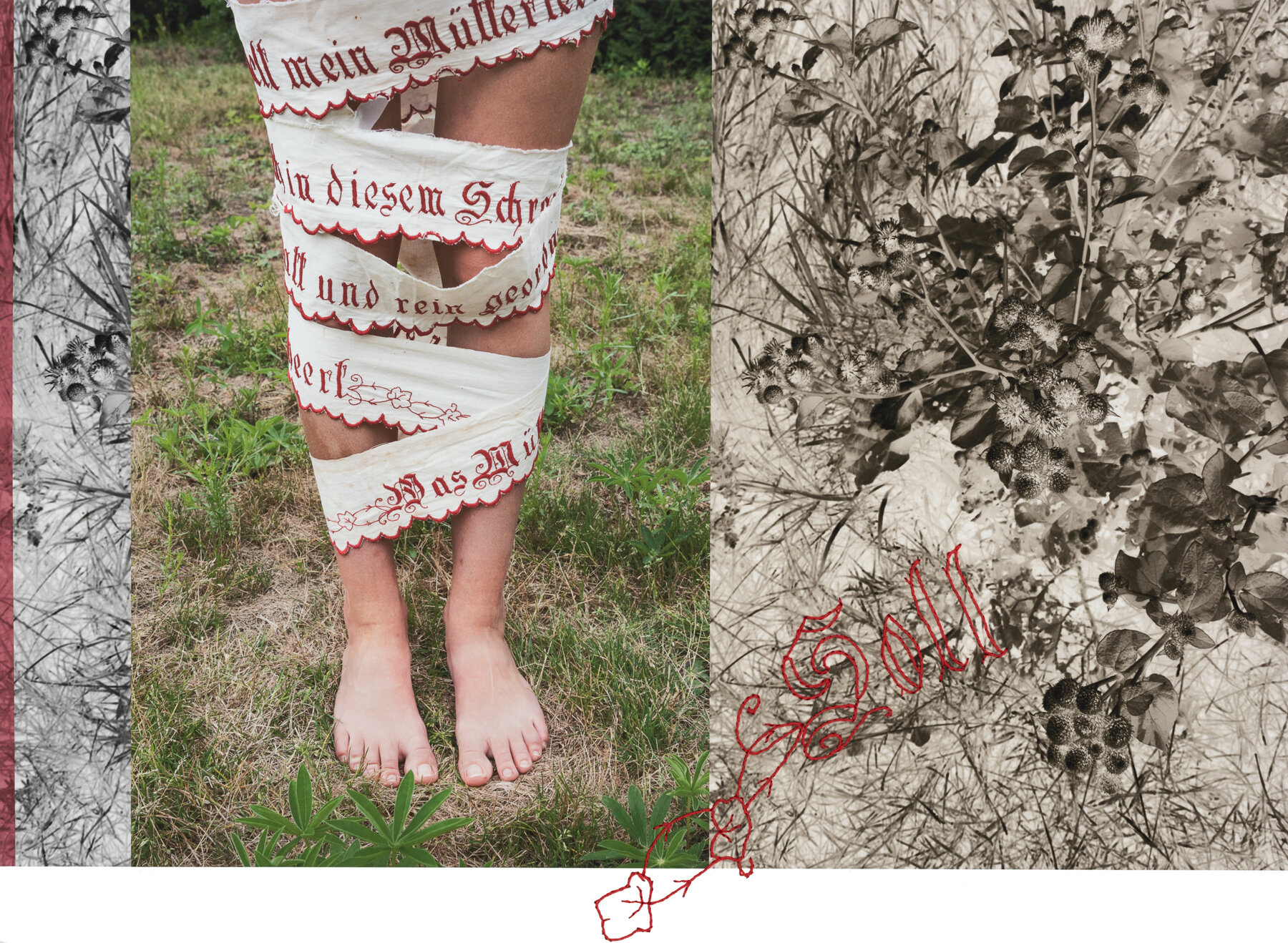
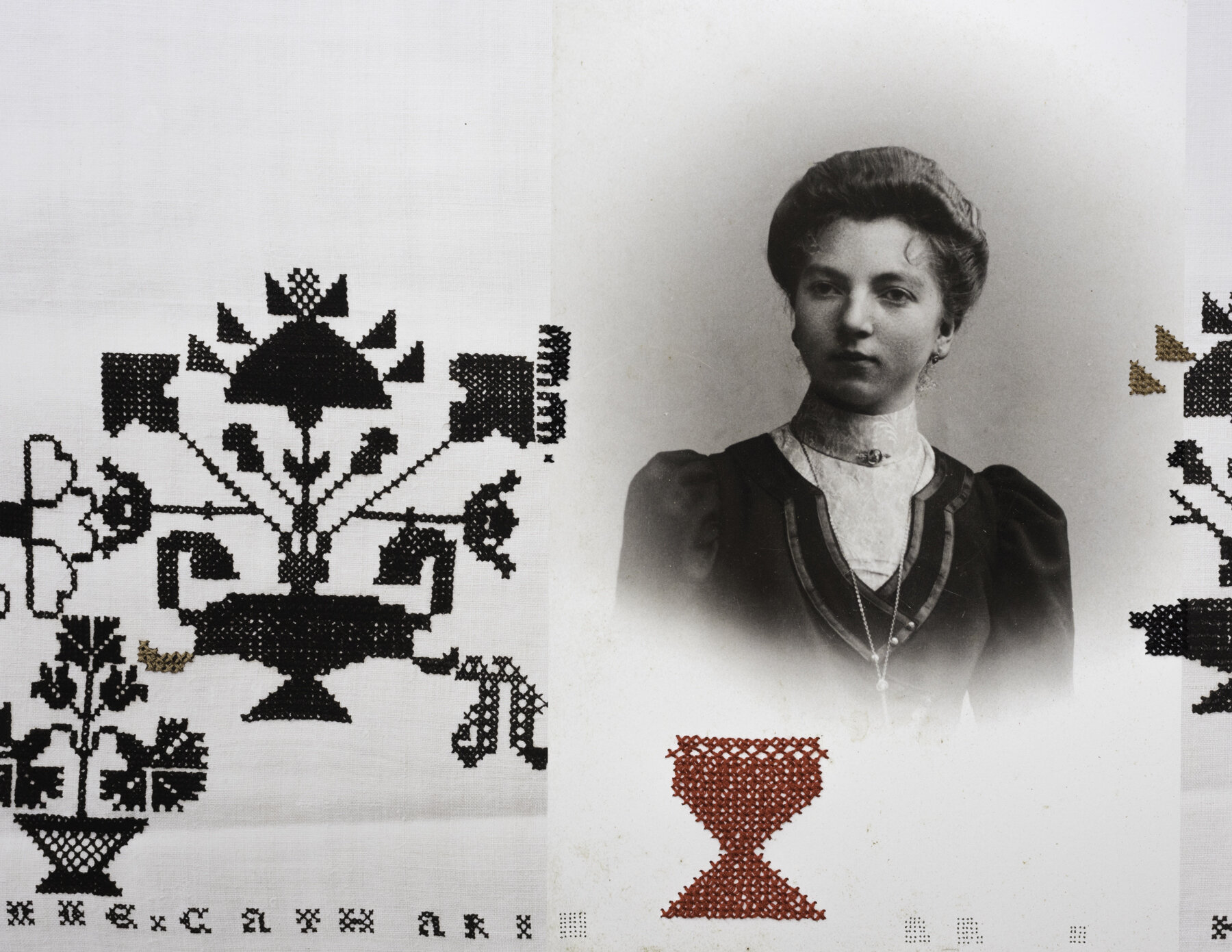
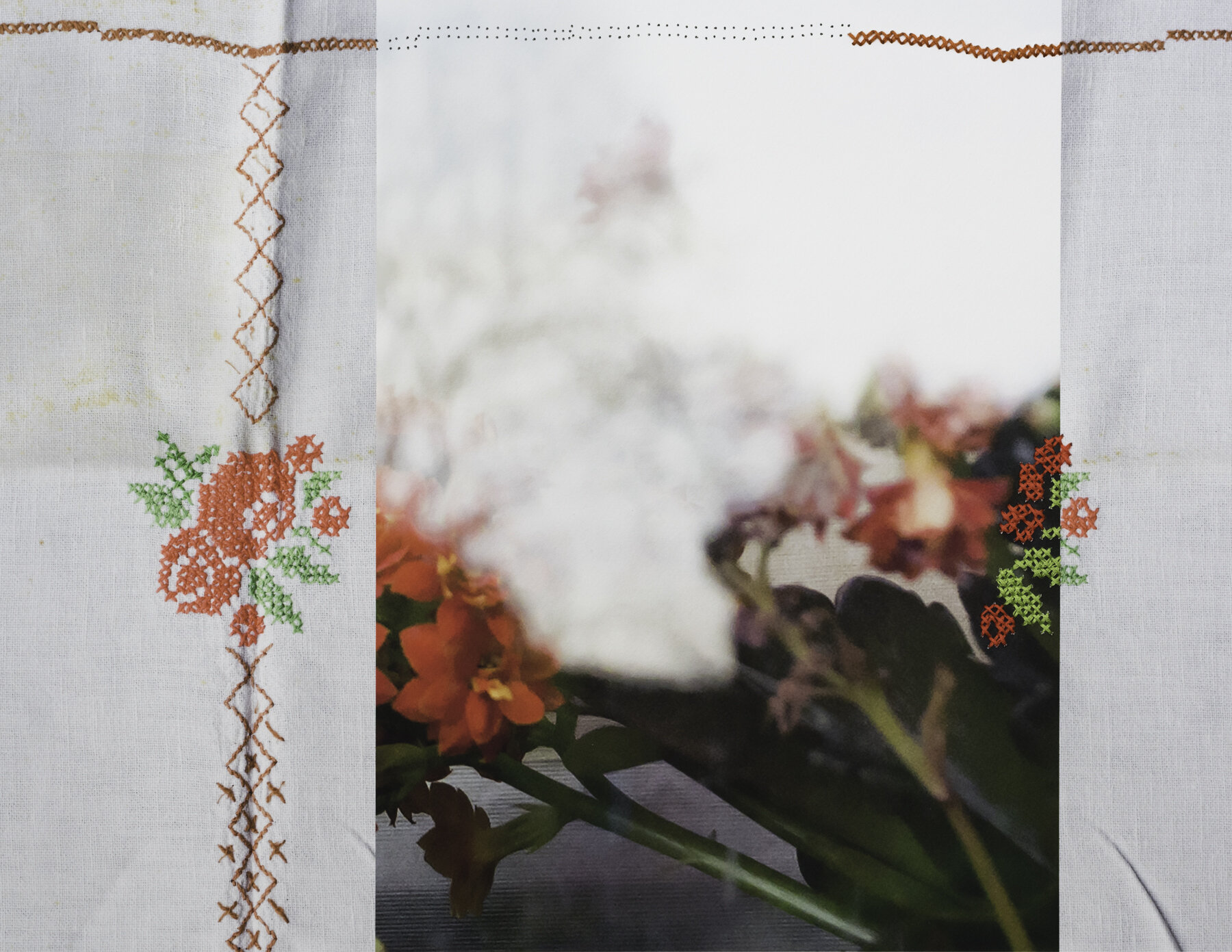
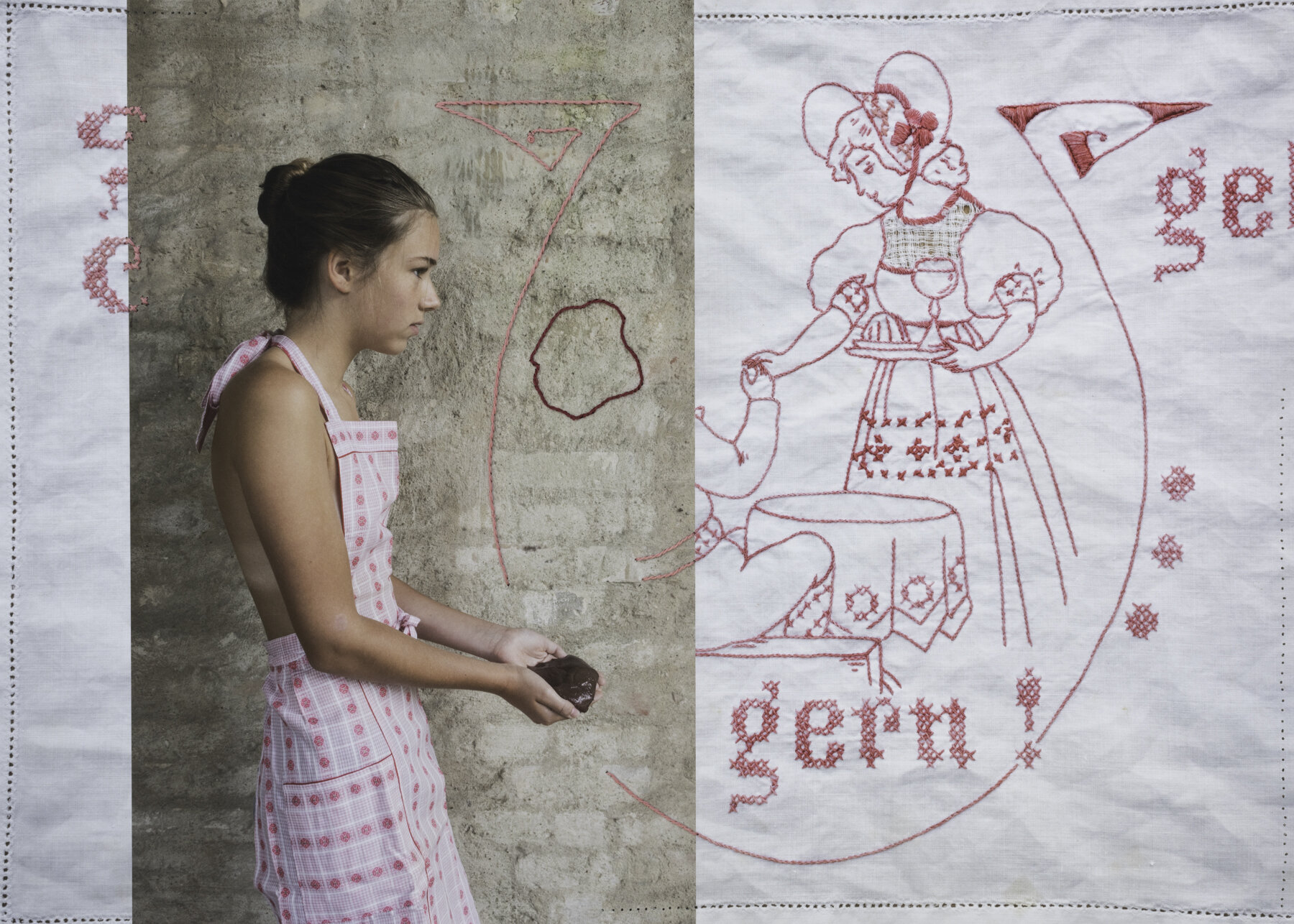
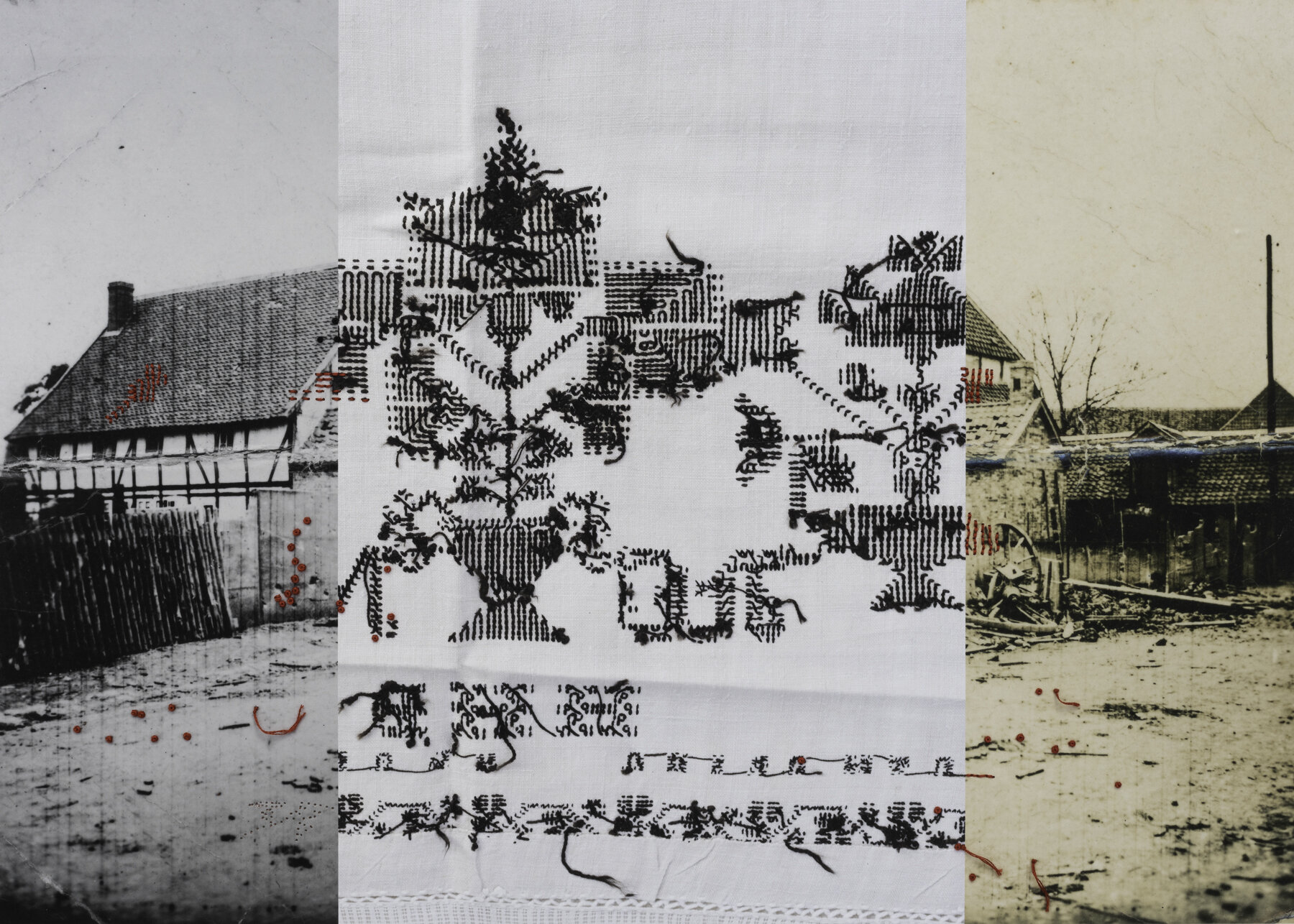
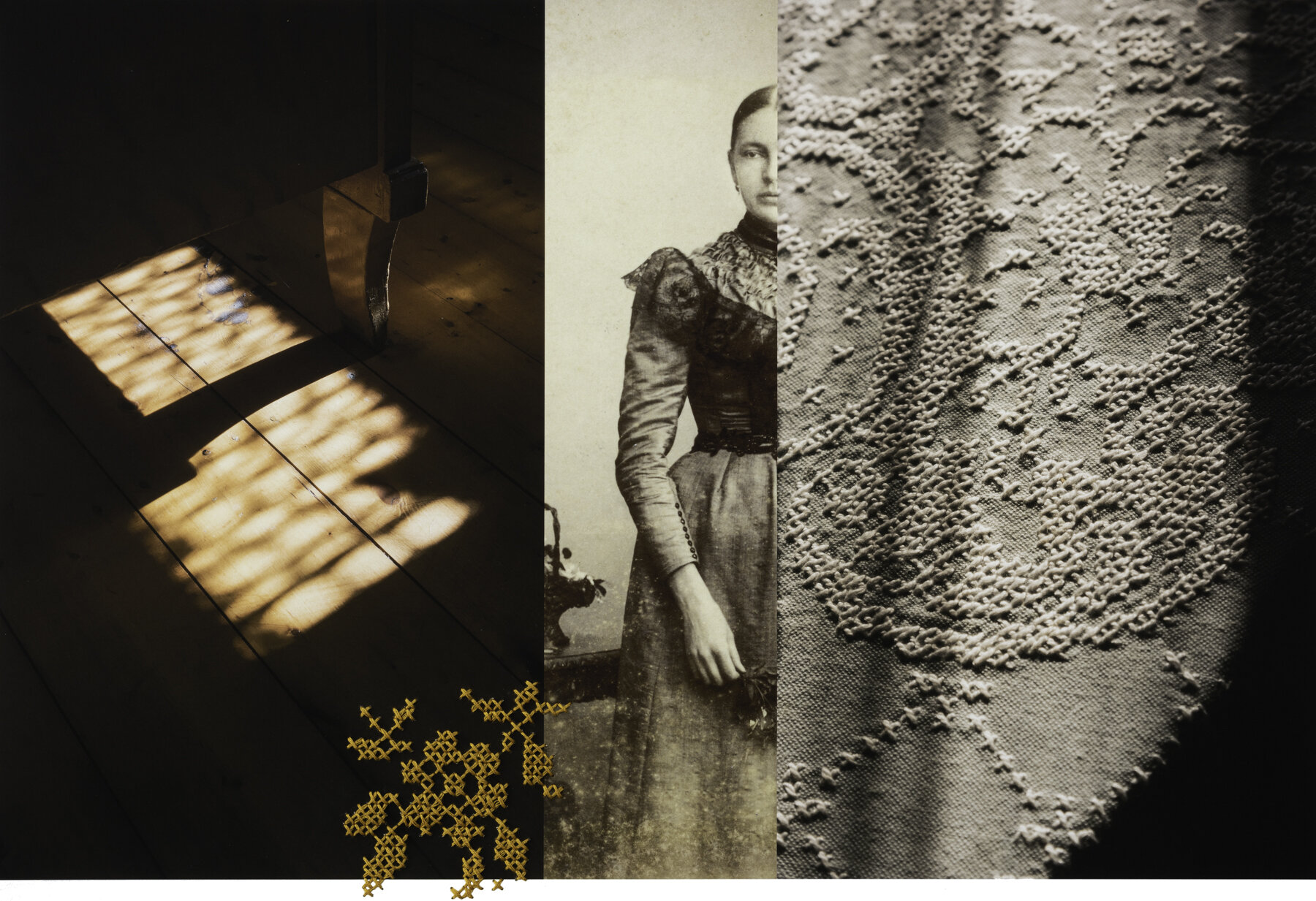
Astrid Reischwitz
The Fabric of Memory
Astrid Reischwitz series, The Fabric of Memory, from the Spin Club Tapestry was inspired by her personal history – long ago in her town in Germany the village women met regularly in “Spinneklumps” (Spin Clubs). They would gather in one another’s homes to spin wool, embroider and stitch fabrics while sharing their thoughts, hopes and friendships – these clubs were often life-long associations. Reischwitz photographs narrate her story of the past, of private spaces, and her own personal history. With memories of living and growing up in Germany as a child and her family traditions continuing to the present day and initiating new traditions with her daughter and husband, Astrid constructs a visual world of memory and identity. Using old family photos and fabrics, new compositions are created taking us from the past to the current day with a hint of the future – these are her memories. Textiles and handwork made by previous generations which have been passed on to her, the keepsakes from women who came before her and women she has grown up with, become he actual fabrics of her memory. The textiles, the materials of the past are altered when she adds to them by hand embroidering herself. What is a memory? How much is true and how much has been altered by time? Memories determine who we are.
…my composite images take the form of tapestries, combining images of embroidered Spin Club fabrics with new and old photographs from the village. I connect the present and the past by re-creating and re-imagining pieces of the embroidery. Spin Club tablecloths, napkins and wall hangings (some dating back to 1799) have been passed down from generation to generation. By following the stitches in these fabrics, I follow a path through the lives of my ancestors - their layout of a perfect pattern and the mistakes they made. Along the way, I add my own mistakes. The fabrics also reveal the passage of time, stained and distorted after sometimes decades of use. The patterns I have stitched myself into the paper are only abstractions of the original Spin Club designs, fragments of memory. After all, memory is fleeting, and changed forever in the act of recollection. Sometimes the stitching is incomplete, creating an invitation for future generations. Every decision we make is influenced by our history, our environment, and the society we live in. The tapestry of my life belongs to me but is stitched through with the beauty and heartache of past generations. -AR
In addition to the photographs in the exhibit, Reischwitz has installed a table with textiles, dishes, the way she remembers.
Reischwitz began her study of photography at the International Center of Photography in New York soon after moving to the United States. She continued her education at the New England School of Photography, Massachusetts College of Art and Design, Lesley University, and the Griffin Museum of Photography. She holds a Certificate in Arts Administration from New York University. Reischwitz is a graduate of the Technical University Braunschweig, Germany, with a PhD in Chemistry.
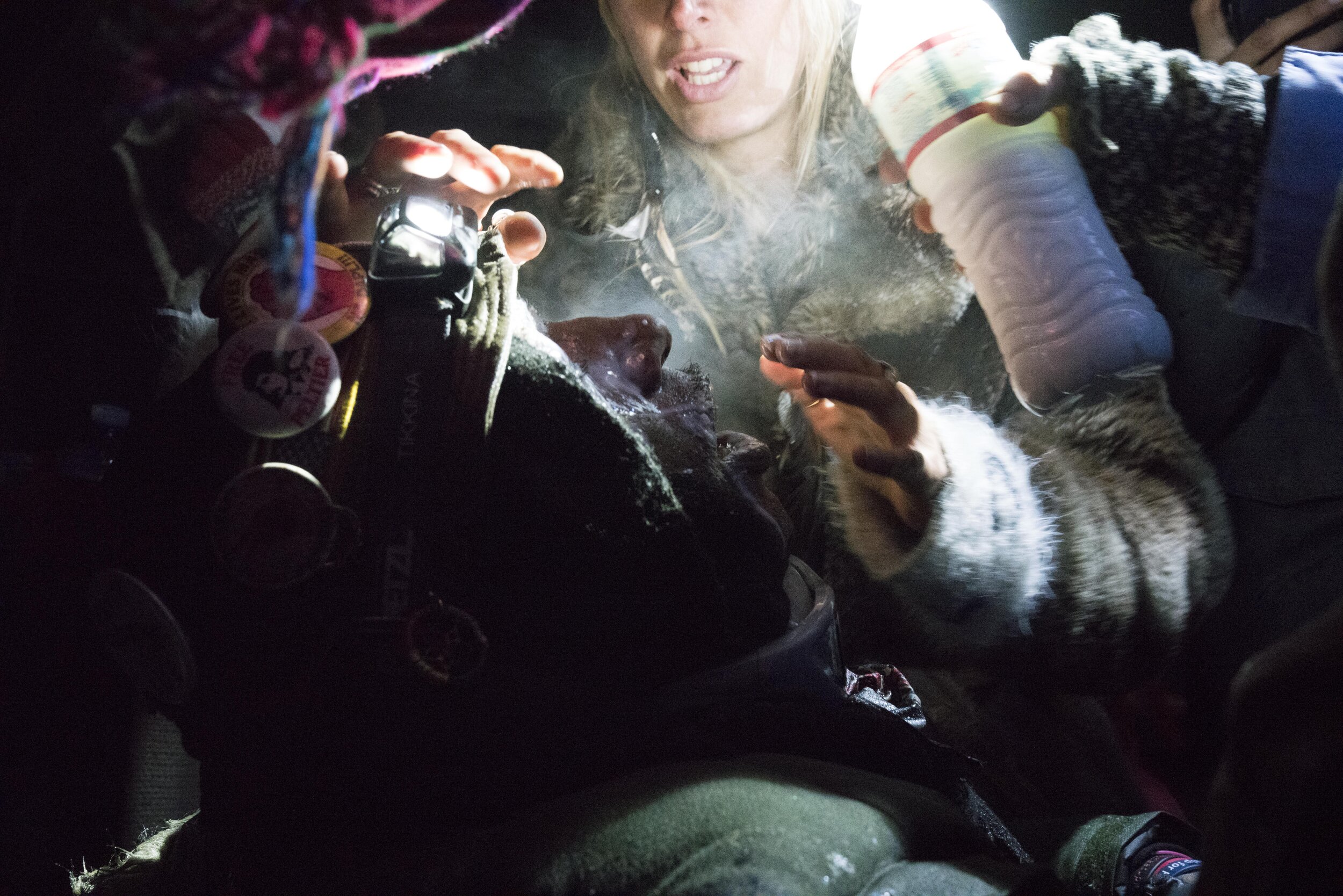
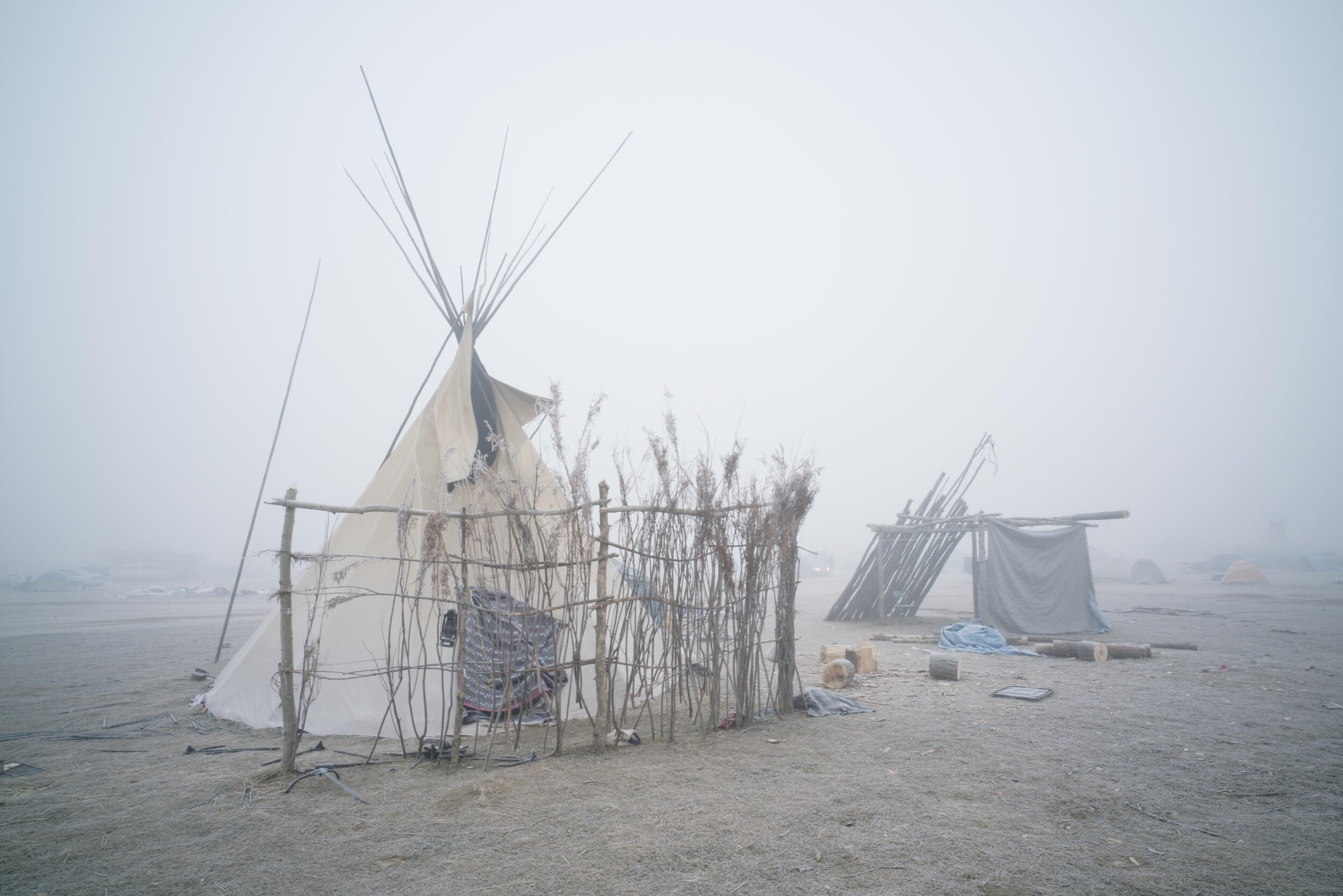



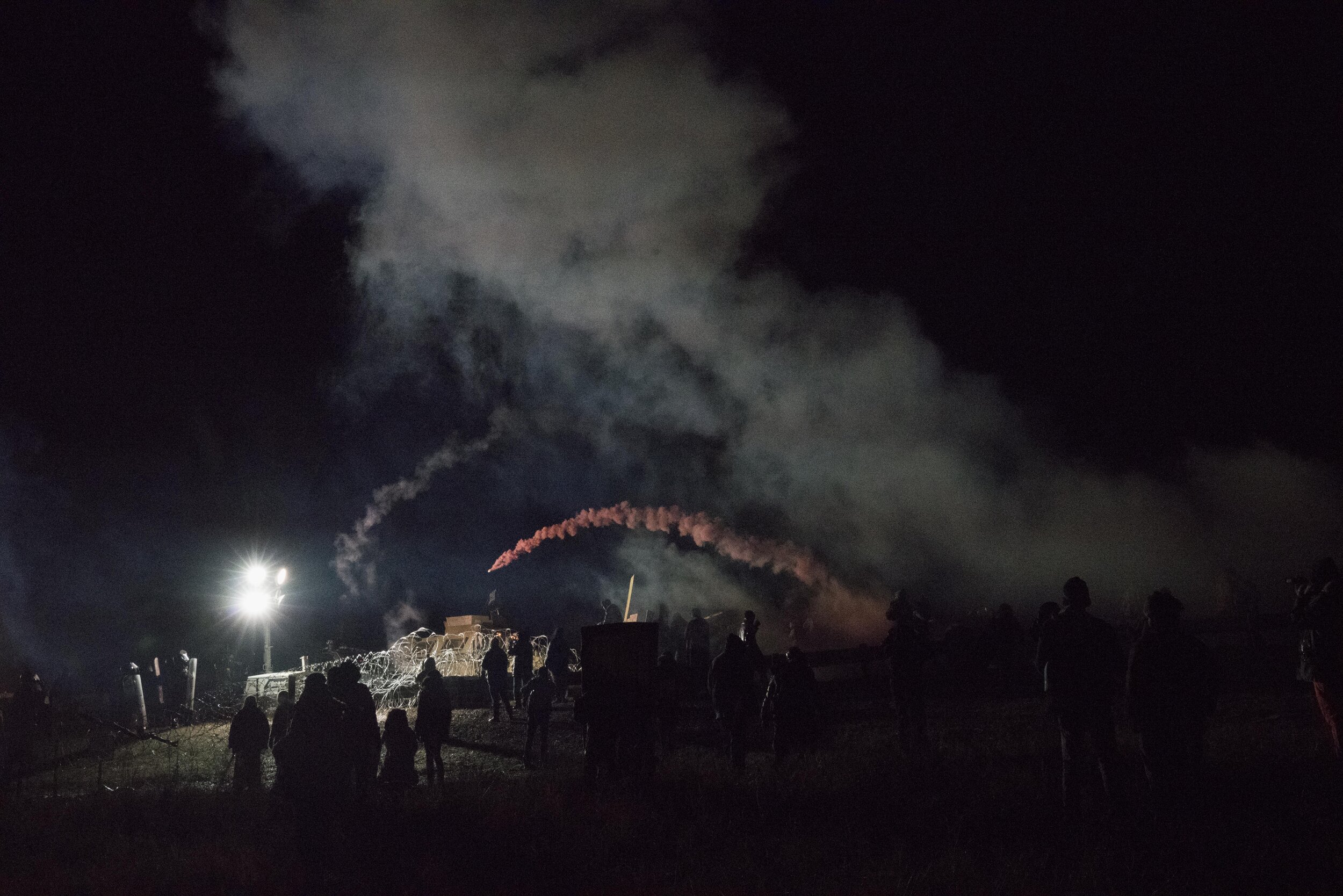
John Willis
Mni Wiconi: Honoring the Water Protectors
Willis’ second series at the gallery, Mni Wiconi, Honoring the Water Protectors, are photographs telling the story of what happened at Standing Rock Indian Reservation from the perspective of those who were there and witnessed the life in the camps and the conflicts with the authorities. When the Standing Rock Indian Reservation learned the Dakota Access Pipeline would pass along the adjacent Missouri River, the tribe’s personal source of water, and through its sovereign and sacred land, the leaders said no. A peaceful resistance grew with over 300 Indian nations around the world participating. The movement lasted for over a year.
John Willis is a photographer who is currently living and teaching in Rhode Island. From 1990 until his retirement in 2020, he was a professor of art at Marlboro College. He has received a John Simon Guggenheim Memorial Foundation Fellowship in Photography and many other grants. His photographs are in more than sixty collections, among them the Amon Carter Museum, Center for Creative Photography, George Eastman Museum of Photography and Film, J. Paul Getty Museum, Heard Museum, High Museum of Art, Library of Congress, Museum of Fine Arts, Boston, Museum of Fine Arts, Houston, National Gallery of Art, San Francisco Museum of Modern Art, Tokyo Metropolitan Museum of Photography, and Whitney Museum of American Art. His books include Mni Wiconi / Water Is Life: Honoring the Water Protectors at Standing Rock and Everywhere in the Ongoing Struggle for Indigenous Sovereignty (George F. Thompson Publishing, 2019), Views from the Reservation: A New Edition (George F. Thompson Publishing, 2019; originally published in 2010 by the Center for American Places at Columbia College Chicago), and, with Tom Young, Recycled Realities (Center for American Places, 2006). His most recent collaborative book project Requiem for the Innocent, El Paso and Beyond has been printed and is available. The book is a collaboration with writer Robin Behn and composer Matan Rubinstein (George F. Thompson Publishing 2020).
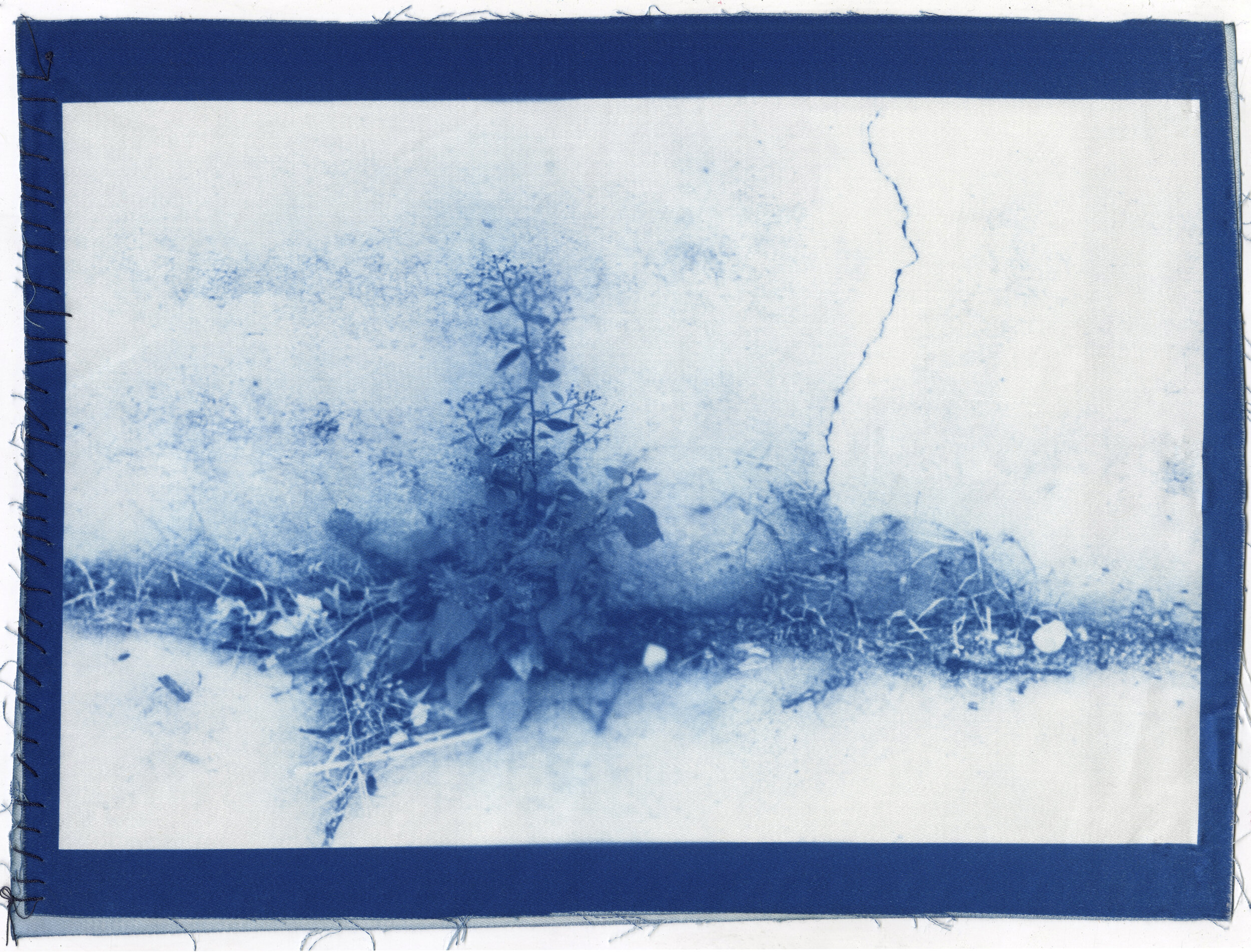
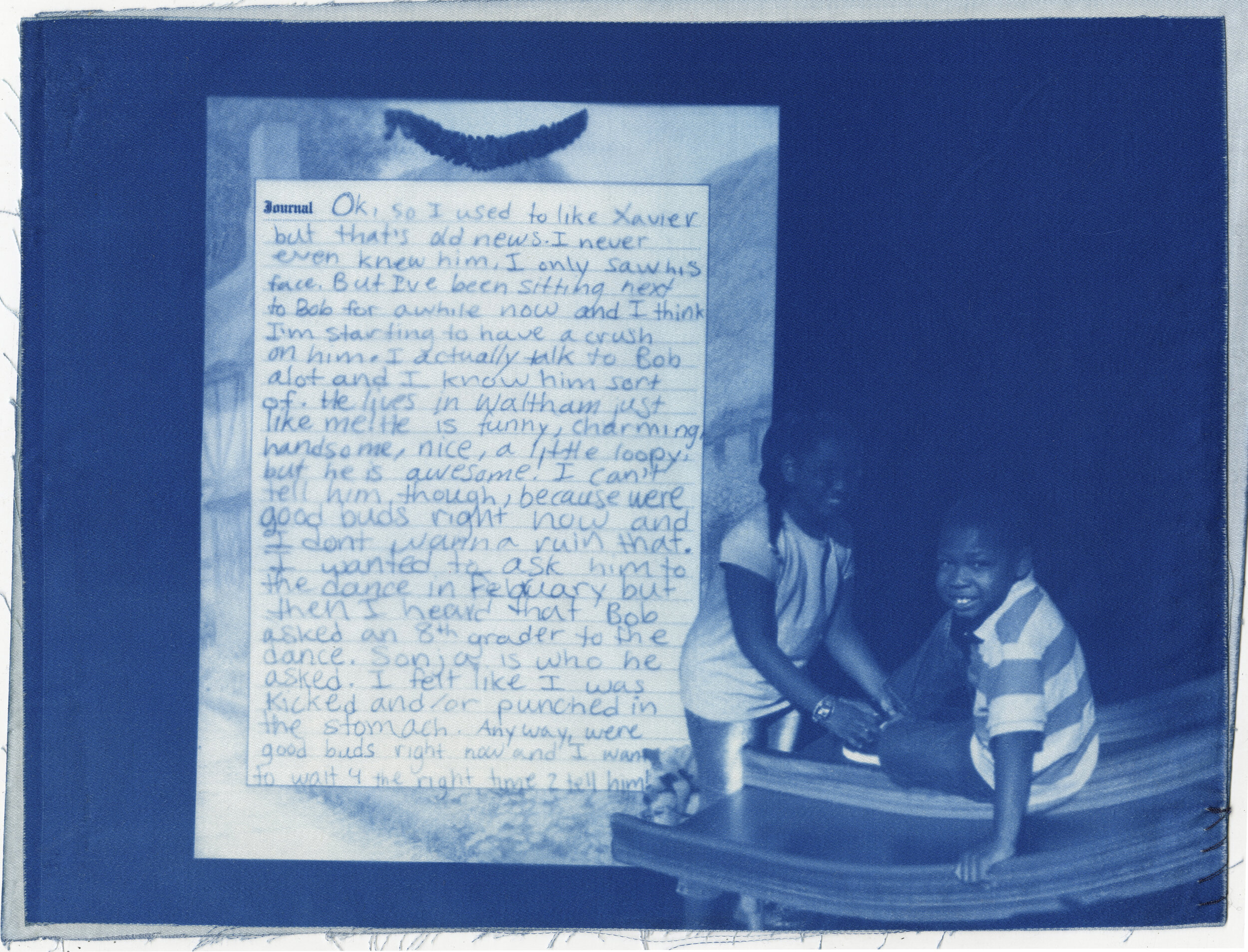
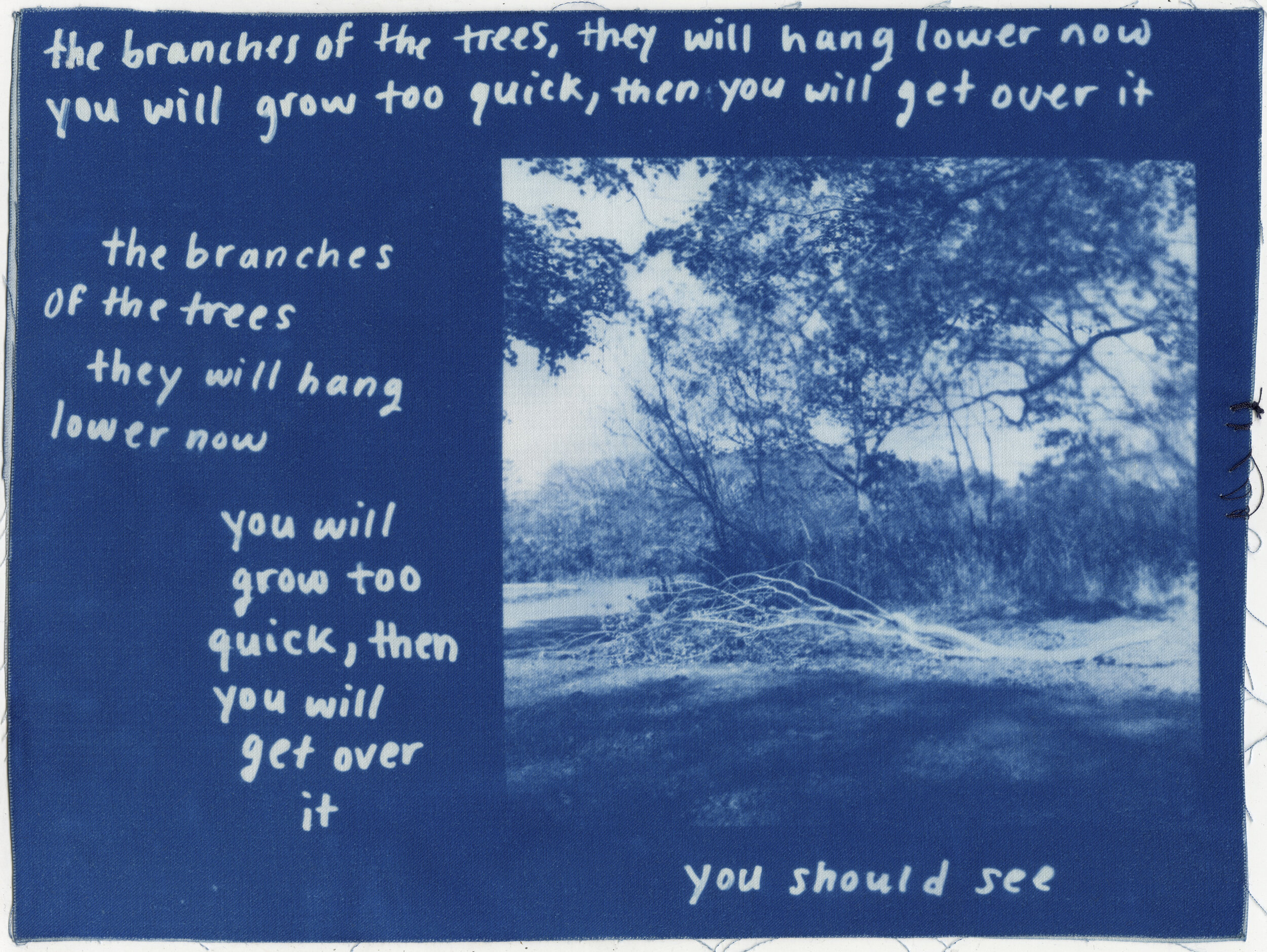
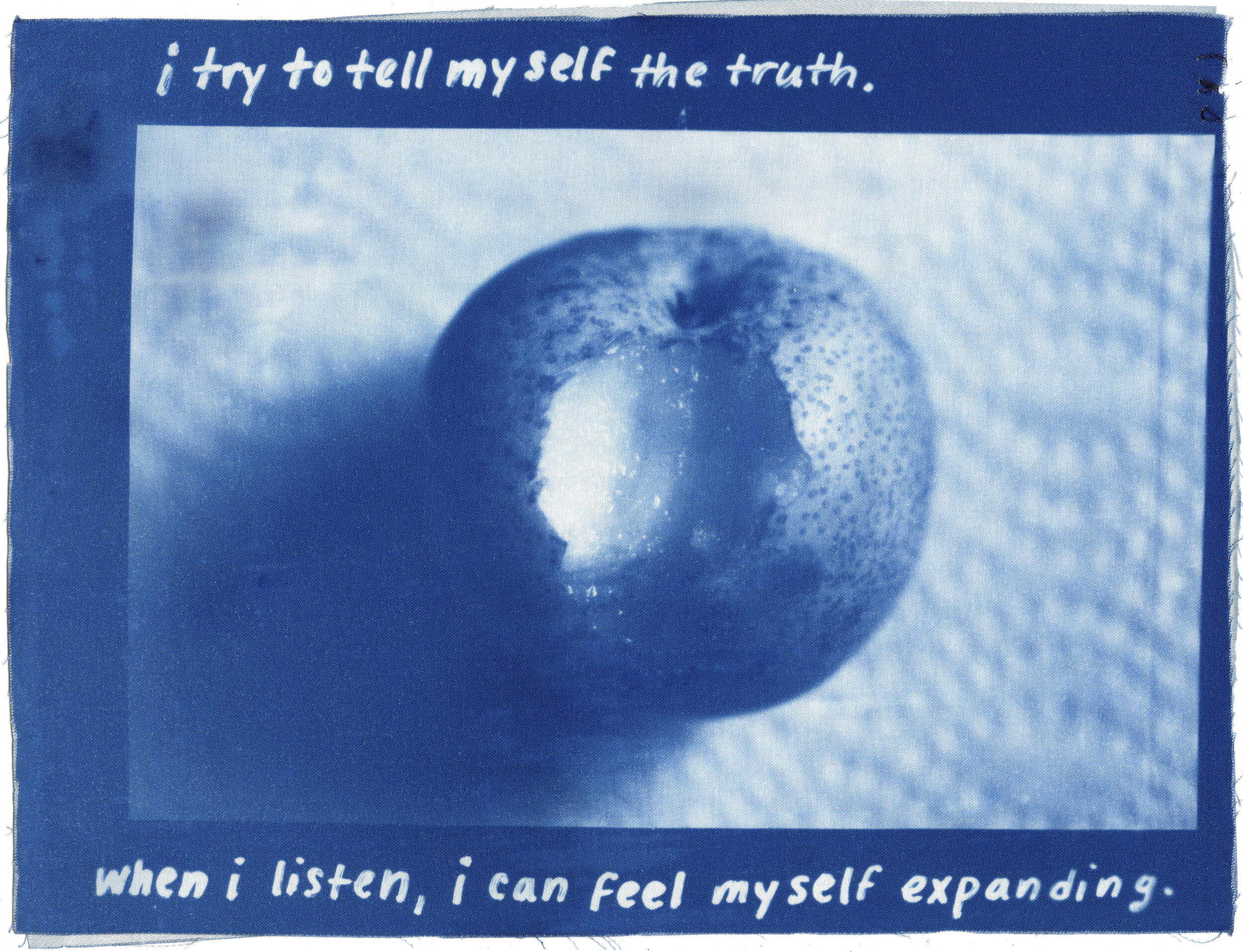
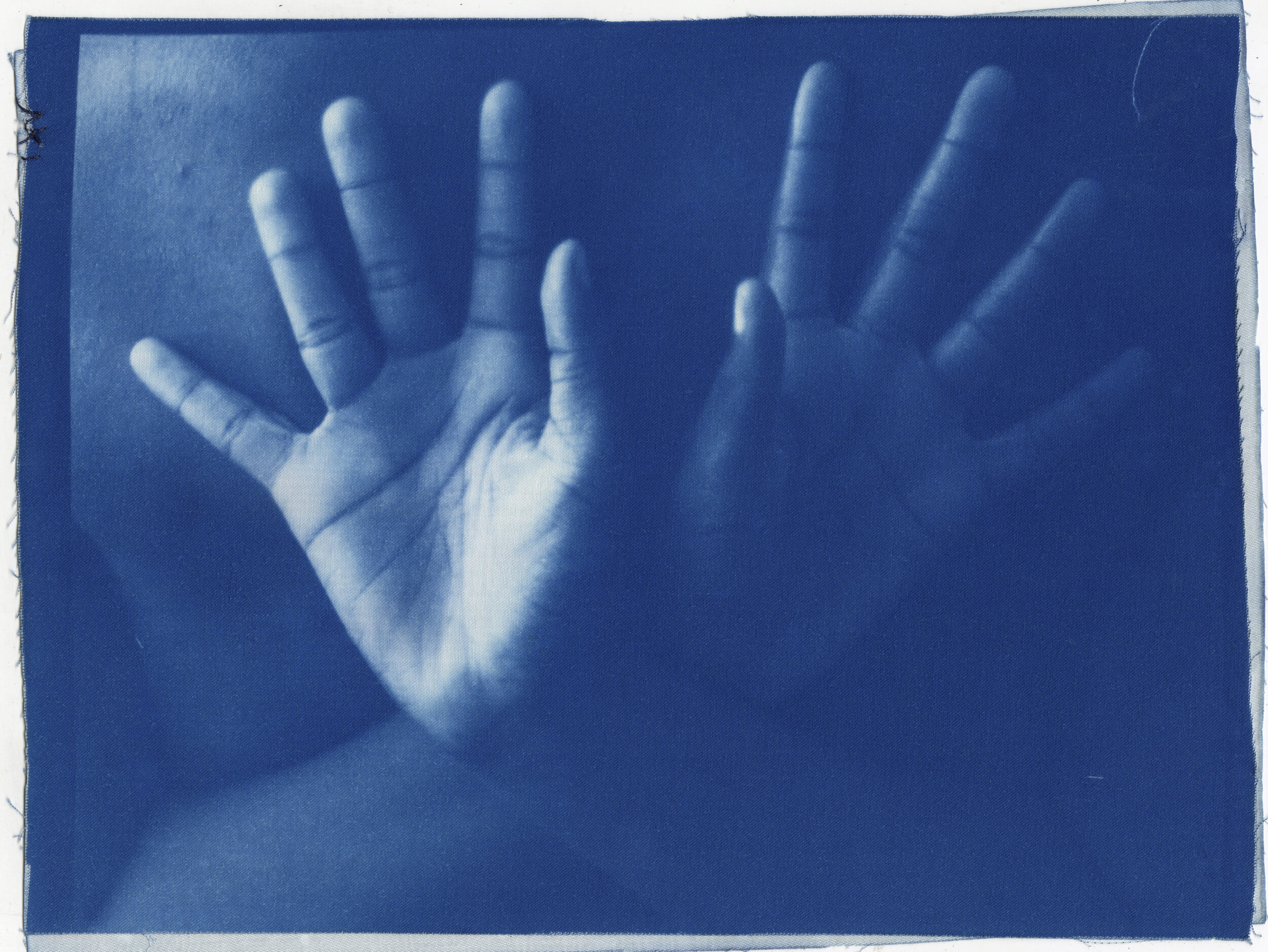
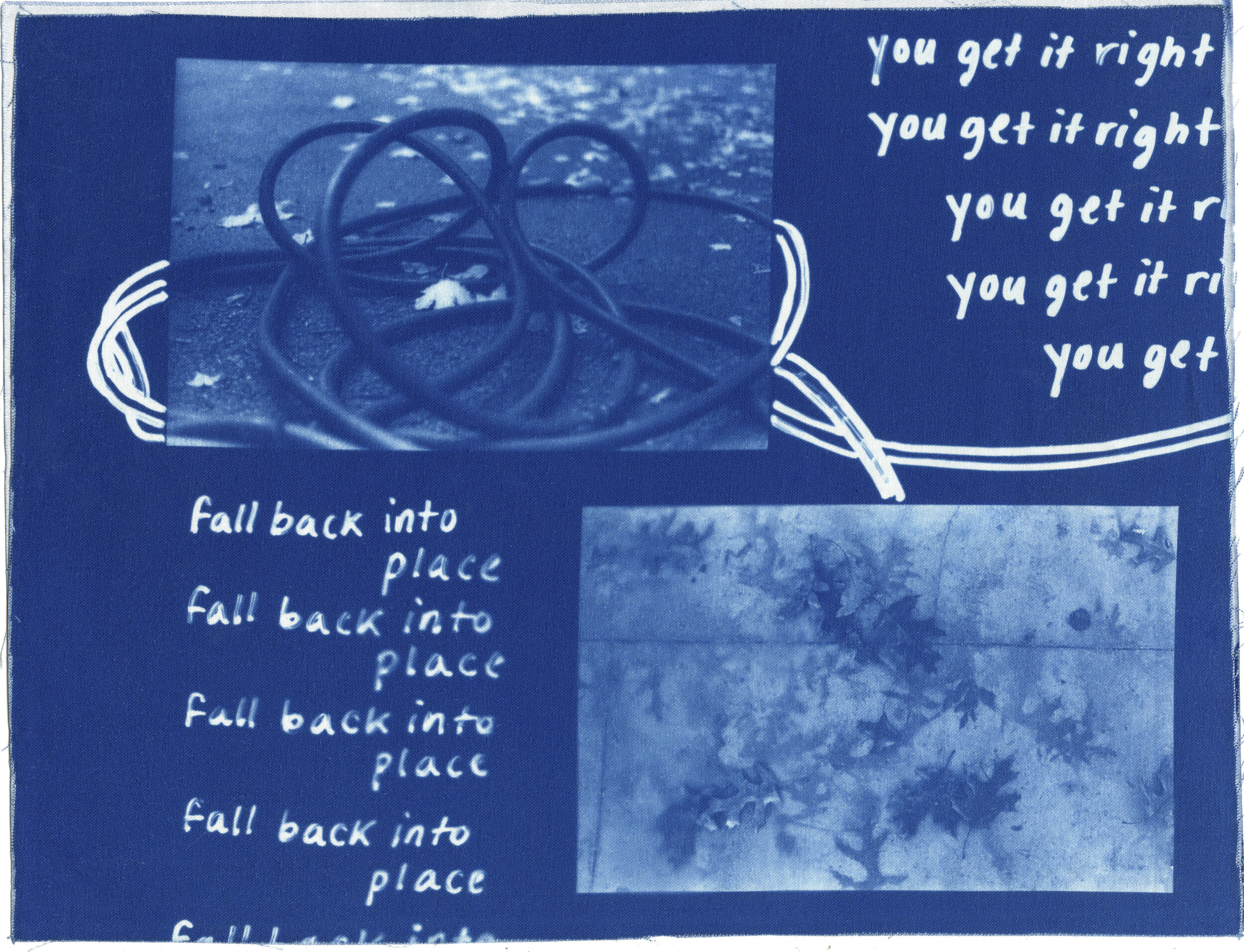
Alcove Gallery: Vanessa Leroy
there’s a place i want to take you
We are honored to be exhibiting Leroy’s series, there’s a place i want to take you. She has created a book of cloth cyanotypes of journal entries from the 5th grade, family scrapbook photographs, passing thoughts, as well as photos she has taken between 2014 and 2019.
I wanted to re-contextualize these images by exposing them to light, creating diptychs, inserting test + illustrations, and binding the timeline with thread…I see photography as a tool for social justice, and with it I hope to create worlds that people feel as though they can enter and draw from, as well as provide a look into an experience that they may not personally recognize. -VL 2019
We share a young girl’s diary of her experiences and balance that against what is the reality of today. We will be showing both Leroy’s handmade book as well as individual pieces.
Vanessa Leroy is a 23-year-old photographer from Waltham, Massachusetts. She is currently completing her Bachelor of Fine Arts in Photography at the Massachusetts College of Art and Design. She remains on the hunt for new ways of seeing, remembering, and altering the world through photography. She is drawn to image making because of the power it holds to create nuanced representation for marginalized people and uplift their stories.
